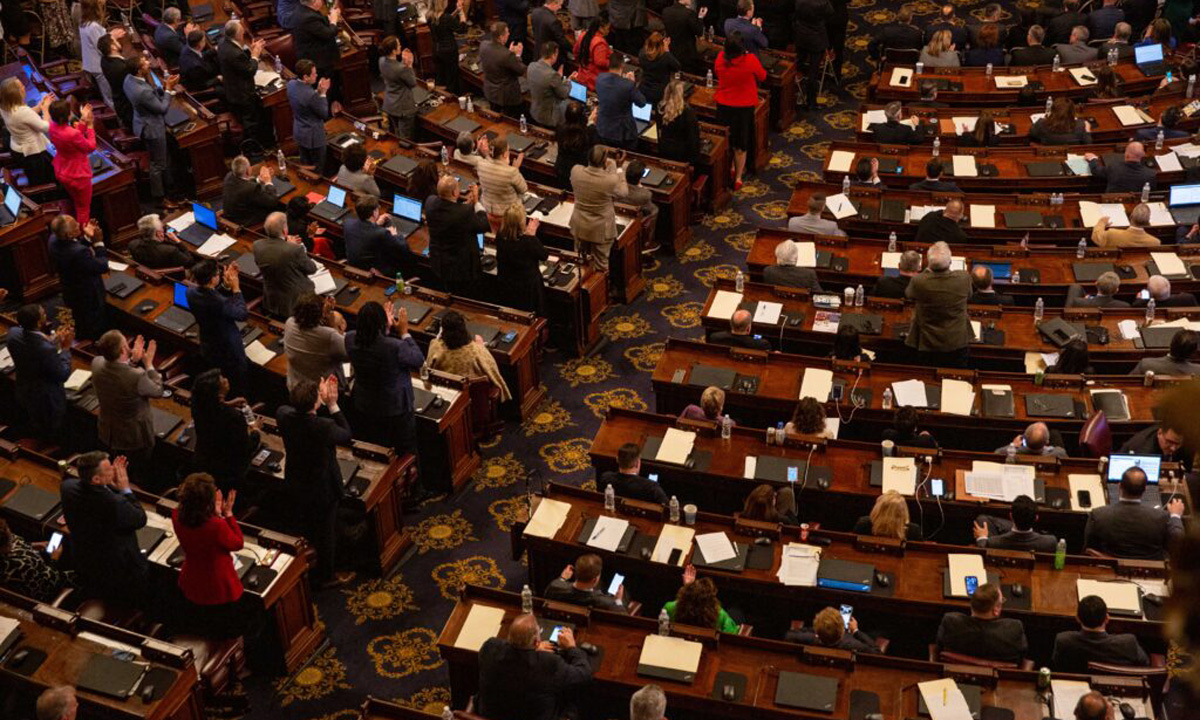Pa. Legislature’s Unfinished Budget Business Leaves Uncertainty for Schools
'It does leave some question marks for some schools and their programs,' Andrew Christ of the Pennsylvania School Boards Association said.

Get stories like this delivered straight to your inbox. Sign up for The 74 Newsletter
Gov. Josh Shapiro’s signature on Pennsylvania’s $45.5 billion budget brought relief Thursday across the commonwealth as the new school year approaches and quarterly payments come due.
But his administration’s decision to hold back hundreds of millions in funds for a handful of programs leaves uncertainty for some as school districts work to reconcile their budgets with the money they expect to receive from the state.
Shapiro touted the budget, which was delivered to his desk by the General Assembly 34 days after the June 30 deadline, as a commonsense spending plan that accomplishes many of the goals laid out in his campaign and budget address.
Budget Secretary Uri Monson informed legislative leaders in a memo this week that he would not release money for seven programs including more than $200 million for public education because the General Assembly has not passed fiscal code bills to authorize the spending.
State Senate President Pro Tempore Kim Ward, R-Westmoreland, nonetheless late on Wednesday called the chamber back to session on Thursday so that Lt. Gov. Austin Davis, acting as Senate president, could sign the general appropriations bill, the final administrative step before sending it to Shapiro’s desk.
Although Democratic leaders said they disagreed that some of the programs require authorizing legislation, they said negotiations on the fiscal code language is ongoing. House Majority Leader Matt Bradford, D-Montgomery, said the House would reconvene when talks are finalized.
The frozen money, totaling $338 million, includes $7.5 million to pay for public defenders for the first time, nearly $21 million to increase ambulance reimbursement rates, $50 million in relief for struggling hospitals, $50 million for grants to help low-income homeowners with maintenance, and $10 million for stipends to attract students to the teaching profession.
The programs for which funding is frozen include $100 million for Level Up supplementary payments to the state’s 100 poorest school districts and $100 million for school mental health grants.
Pennsylvania School Boards Association Senior Director of Government Affairs Andrew Christ said school districts have 30 days after the state budget is finalized to reopen and reconcile their budgets with the funding they expect to receive from the state.
But with significant sums in state subsidies in limbo, some districts that have received Level Up payments in the past could be uncertain about what they will receive.
While Christ said it is safe to assume that the Education Department will use the same formula this year as it has used in the past, districts that are on the cusp of eligibility may not have a full picture of their financial situation until the money is released.
A delay in releasing the mental health grant money could also force school districts to move money from other areas in order to pay contracted providers, he said.
“It does leave some question marks for some schools and their programs,” Christ said.
Human services make up the largest share of the state budget, and county human services agencies and providers are often the most seriously affected by budget delays.
Richard Edley of the Rehabilitation and Community Providers Association said the end of the impasse is a good thing because the strain on county human services would have been great and may have impacted Medicaid payments and federal matching funds if it had continued.
However, Edley said, the budget was disappointing for human services providers, who spoke out during budget negotiations about a $170 million cut in funding for intellectual and developmental disability care providers.
Advocates said money to pay the wages of direct support providers who care for individuals with severe autism and other disabilities was cut due to a drop in spending. But the drop in spending was a result of a workforce shortage driven by insufficient wages that has left thousands of people on a waiting list.
“The financial losses of providers are mounting. The administration and legislature believe providers will somehow ‘figure it out.’ Eventually they will not be able to,” Edley said.
Edley said he is hopeful that as lawmakers return to the negotiating table to work out the authorizing language for the frozen programs, they restore $100 million that had been earmarked to address mental health needs identified by the legislature’s Behavioral Health Commission.
That money, received as part of the state’s American Rescue Plan aid during the pandemic, was redirected in the Senate’s version of the budget to the school mental health program.
The House passed legislation in June with a bipartisan 173-30 vote to direct the aid money into three streams to train and retain behavioral health professionals, provide criminal justice agencies with mental health resources and award grants to county mental health agencies and providers.
State Rep. Mike Schlossberg, D-Lehigh, and Sen. Maria Collett, D-Montgomery, held a rally at the Capitol last month on restoring the funding. Schlossberg said the Senate budget amendment redirecting the pandemic aid to school grants was improper and gave the appearance that it was an either-or proposition.
In past budgets, the fiscal code has included supplementary appropriations and it is still possible to restore the funding approved in the House.
“The money is absolutely still there to make that happen,” Schlossberg said.
Pennsylvania Capital-Star is part of States Newsroom, a network of news bureaus supported by grants and a coalition of donors as a 501c(3) public charity. Pennsylvania Capital-Star maintains editorial independence. Contact Editor John Micek for questions: info@penncapital-star.com. Follow Pennsylvania Capital-Star on Facebook and Twitter.
Get stories like these delivered straight to your inbox. Sign up for The 74 Newsletter

;)